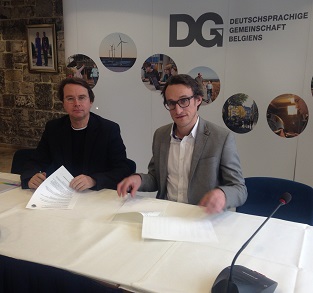ITEM starts EMR study: cross border job mediation
In a cross-border region with more international than national borders one might consider taking up a position across the national border in a neighboring country. In the Netherlands, Belgium and Germany help is available for making this transition via cross border employment service teams (namely the partners of EURES-Network) that support placement of workers with employers and institutions across the border. However, up until now, there was no clear overview of the comparability of processes involved nor is there an comparable overview of annual volumes of workers who were successfully placed across the border.
In a cross-border region with more international than national borders one might consider taking up a position across the national border in a neighboring country. In the Netherlands, Belgium and Germany help is available for making this transition via cross border employment service teams (namely the partners of EURES-Network) that support placement of workers with employers and institutions across the border. However, up until now, there was no clear overview of the comparability of processes involved nor is there an comparable overview of annual volumes of workers who were successfully placed across the border.
In the coming months ITEM will work closely with the German Bundesagentur für Arbeit, VDAB, UWV, Le Forem, Arbeitsamt der Deutschsprachigen Gemeinschaft Belgiens and Grenzinfopunkte to investigate the process of cross border employment services. Which criteria determine whether cross border job mediation c.q. placement has been successful? Which initiatives are undertaken by the Netherlands, Belgium and Germany to achieve concrete results for their citizens in this respect? Are there best-practices and data already available in relation to cross border job mediation and how to compare them?
This new ITEM partnership study was launched January 20th 2016 by EuregioMaas-Rhine (EMR), financed from the “Europees Werkgelegenheids -en Sociale Innovatieprogramma” (EaSI in English). Online-questionnaires combined with face-to-face interviews on site will be carried out.
For now it is already clear that huge differences exist between the five partner organisations in terms of annual numbers and definitions. Both ITEM and EMR wish to clarify these issues and get more insight into the practices of cross border employment services within the EMR. A visual description of the cross border practices for each country will be provided. Furthermore, if possible, ITEM will come up with recommendations for future international benchmarking and data collection on this topic. Finally, best-practices will be shared with EMR job consultants. The study period runs until June 2016, results will be disseminated with practitioners via specific seminars and the general public through the ITEM website.

ITEM: Expertise Centre for practice and policy
The Institute for Transnational and Euregional Cross Border Cooperation and Mobility (ITEM), founded in 2015, is the pivot of research, counselling, knowledge exchange and training activities with regard to cross border mobility and cooperation. ITEM’s strength is the scientific and interdisciplinary approach that brings concrete practical solutions for the advisory bodies, politics and interested parties. ITEM focuses both on the direct mobility across national borders (the traditional cross border commuting and mobility of patients and students) as well as on migration over a longer distance within or outside of Europe (of students, knowledge migrants and migrant workers and their families).
The geographical core area of ITEM consists of the Benelux countries and their direct neighboring countries, with special attention for the Euregions. ITEM contributes to the strategic programme Kennis-As Limburg which in its turn is aimed at the reinforcement of the sustainable economic and social structure in Limburg. The Expertise Centre contributes to the objections of the Kennis-As, particularly through research for a better integration in the society of the international knowledge workers and for the development of the labour market in the Euregion. With this, ITEM also contributes to the development of other Kennis-As projects, provincial projects and Brightlands campus developments.
Also read
-
Four young UM researchers have received a Veni grant worth up to €320,000 from the Dutch Research Council (NWO). This will allow them to further develop their own research ideas over the next three years.
-
Billions of dollars in foreign aid could be spent more effectively if international poverty statistics weren’t so inaccurate. Says Dr Michail Moatsos, Assistant Professor at Maastricht University School of Business and Economics.


